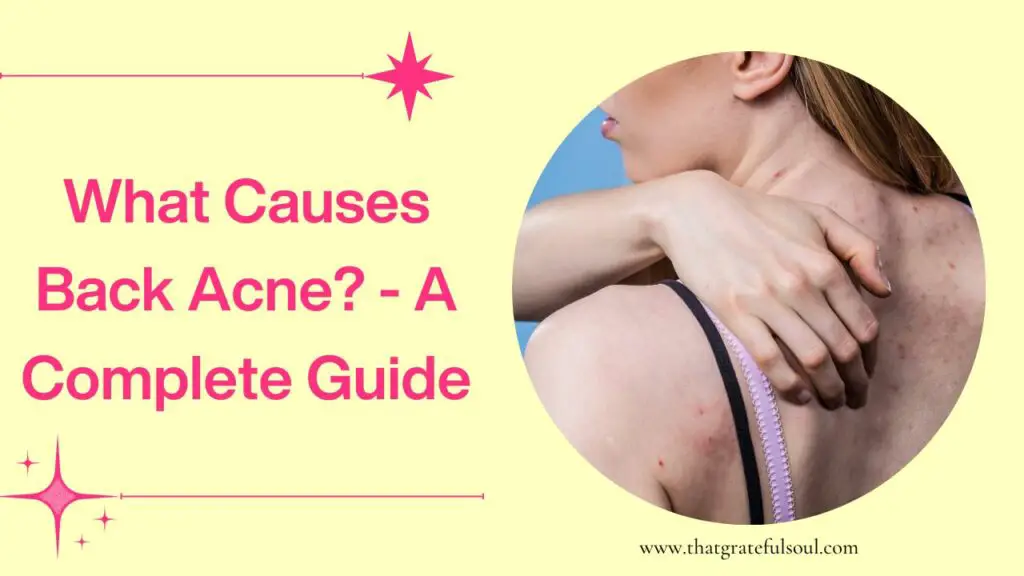Acne is a common skin condition that affects millions of people worldwide. While most people experience acne on their face, neck, and chest, it can also occur on the back.
Back acne, also known as bacne, can be a challenging condition to manage, and it can cause discomfort and embarrassment. In this article, we’ll explore the causes of back acne and the best ways to prevent and treat it.

-
Save
Table of Contents
What is Back Acne?
Back acne is a type of acne that occurs on the back, shoulders, and upper arms. The condition is similar to facial acne and is caused by clogged pores and overactive sebaceous glands.
Back acne can manifest in the form of pimples, blackheads, and whiteheads. In severe cases, it can cause painful cysts and nodules.
The Causes of Back Acne
There are several factors that can contribute to the development of back acne. Let’s take a closer look at some of the most common causes.
Hormones –
Hormonal imbalances can cause the sebaceous glands to produce excess oil, which can clog pores and lead to acne. Hormonal changes during puberty, menstruation, pregnancy, and menopause can all contribute to back acne.
Additionally, high levels of stress can trigger hormonal imbalances and worsen acne.
Genetics –
Back acne can also be hereditary. If one or both of your parents had acne, you may be more prone to developing it yourself.
Sweat –
Sweat can contribute to back acne by trapping dirt, bacteria, and dead skin cells in the pores. This can lead to clogged pores and breakouts.
Sweating during exercise or in hot and humid weather can make back acne worse.
Friction and Pressure –
Friction and pressure from tight-fitting clothing, backpacks, and sports equipment can irritate the skin and lead to the development of acne.
This is especially true if the clothing or equipment rubs against the skin for extended periods.
Clothing –
Certain types of clothing can also contribute to back acne. Tight-fitting clothing made from synthetic materials can trap sweat and bacteria against the skin, leading to breakouts.
Wearing clothing that isn’t breathable, like tight-fitting sports bras or shirts, can also cause acne.
Diet –
While the link between diet and acne is not fully understood, some studies suggest that certain foods can trigger breakouts.
Foods high in sugar and refined carbohydrates, like white bread and pasta, can cause spikes in blood sugar levels that can worsen acne.
Additionally, dairy products and foods high in iodine, like seaweed, can also contribute to acne.
Skincare Products –
Some skincare products can clog pores and cause acne. Products that contain oils, like body lotions and sunscreens, can be especially problematic.
Stress
High levels of stress can trigger hormonal imbalances that can lead to the development of acne, including back acne.
Stress can also lead to poor lifestyle habits, like poor diet and lack of sleep, which can worsen acne.
Prevention and Treatment of Back Acne
While back acne can be challenging to manage, there are several things you can do to prevent and treat it. Here are some tips:
Keep the Skin Clean and Dry
Keeping the skin clean and dry is essential for preventing and treating back acne. Showering after sweating, like after exercising, can help prevent sweat from clogging pores. Using a gentle, non-comedogenic cleanser can also help keep the skin clean.
Wear Loose Clothing
Wearing loose-fitting clothing made from breathable materials, like cotton, can help prevent friction and pressure on the skin, which can cause acne.
Practice Good Hygiene
Practicing good hygiene is essential for preventing back acne. Shower daily, wash your clothes and bed sheets regularly, and avoid wearing tight clothing or backpacks. Use a gentle cleanser and avoid scrubbing the skin too hard.
Use Acne-fighting Products
There are several acne-fighting products that can be used to treat back acne. These include benzoyl peroxide, salicylic acid, and alpha-hydroxy acids. These products can help to unclog pores and reduce inflammation.
Seek Professional Treatment
If your back acne is severe or doesn’t respond to over-the-counter treatments, you may need to see a dermatologist. A dermatologist can prescribe stronger medications or recommend other treatments, such as laser therapy or chemical peels.
Avoid Certain Medications
If you are taking medications that are known to cause acne, talk to your doctor about alternative treatments. Your doctor may be able to prescribe a different medication that doesn’t cause acne.
Manage Stress
Stress can also contribute to the development of back acne. Practice stress-reducing techniques such as yoga, meditation, or deep breathing exercises.
Follow a Healthy Diet
Following a healthy diet can also help to prevent back acne. Avoid consuming foods that are high in sugar, refined carbohydrates, and dairy products, as these can trigger acne. Instead, eat a diet that is rich in fruits, vegetables, whole grains, and lean protein.
Stay Hydrated
Staying hydrated is important for maintaining healthy skin. Drink plenty of water throughout the day to keep your skin hydrated and to flush out toxins that can contribute to acne.
Use Non-comedogenic Products
Avoid using products that are known to clog pores, such as heavy moisturizers, oils, and makeup. Use non-comedogenic products that are specifically formulated for acne-prone skin.
Avoid Sun Exposure
Excessive sun exposure can aggravate back acne and cause scarring. Use a broad-spectrum sunscreen with an SPF of at least 30 when spending time outdoors.
Don’t Pick or Pop Pimples
Picking or popping pimples can cause further inflammation and scarring. Avoid touching or squeezing pimples, as this can make them worse.
Conclusion
Back acne can be a frustrating and embarrassing condition, but there are steps you can take to prevent and treat it.
By keeping the skin clean and dry, wearing loose-fitting clothing, using non-comedogenic skincare products, and seeing a dermatologist if necessary, you can improve your skin and reduce the occurrence of back acne.
FAQs
Can stress cause back acne?
Yes, high levels of stress can trigger hormonal imbalances that can lead to the development of back acne.
Can diet contribute to back acne?
Yes, certain foods, like those high in sugar and refined carbohydrates, can worsen acne. Additionally, dairy products and foods high in iodine can also contribute to acne.
What type of clothing should I wear to prevent back acne?
Loose-fitting clothing made from breathable materials, like cotton, can help prevent friction and pressure on the skin, which can cause acne.
What skincare products should I use to prevent back acne?
It’s important to use non-comedogenic skincare products that are labeled as such to prevent clogged pores and acne.
When should I see a dermatologist for my back acne?
If your back acne is severe or persistent, it’s a good idea to see a dermatologist. They can prescribe medications or treatments that can help clear up the acne.
-
Save
ThatGratefulSoul
-
Save

